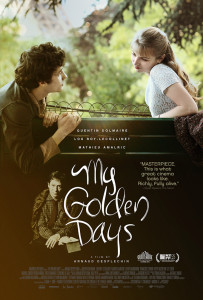My Golden Days (“Trois Souvenirs De Ma Jeunesse”) | Directed By: Arnaud Desplechin | Rating: 8/11 |

Released: March 18, 2016
My Golden Days (“Trois Souvenirs De Ma Jeunesse”) is undoubtedly French and deeply nostalgic. Director Arnaud Desplechin, who is known as “the Frenchest of French directors,” returns to the character of Paul Dedalus (Mathieu Amalric) who first appeared in My Sex Life…Or How I Got Into an Argument. My Golden Days serves a prequel to that film, in which Paul recounts stories of his youth to his lover before he returns to his desk job in Paris. The film’s three parts are all masterfully done, but the third and final segment titled “Esther” is what gives the film its nostalgic, and at times, rather bleak look at love.
Even if you have not seen My Sex Life, they will have no trouble understanding My Golden Days. The two films easily work as standalone pieces, and part of this is due to the impressive performance by Quentin Dolmaire, who plays the young Paul in his flashbacks. Dolmaire perfectly captures the awkward tendencies of a teenage boy, as well as the frustrations of a first love.
The film is divided into three parts, which its French title hints at more strongly than its English one. The first segment focuses on Paul’s harrowing childhood, where he grows up with a mentally ill mother (an early scene shows Paul brandishing a knife at his mother, screaming at her to get back) before he escapes to live with his aunt. Although this segment is brief, it’s powerful, and helps to explain some of Paul’s behavior later on in the film. The next segment is a complete shift in tone as the film turns from a dark family drama to a Cold War-era thriller. As teenagers, Paul and a classmate help to free some citizens living in the USSR. It makes sense as to why Paul muses that he doesn’t know who he is, as he conveniently “loses” his passport and ends up with another doppleganger living in Australia.
The third and final segment focuses on Paul’s complex relationship with the alluring Esther (Lou Roy-Lecollinet), a stunning classmate of his sister’s who has more than a few casual admirers. His complex relationship with Esther explains why Paul has further romantic difficulties in the future, as well as why he yearns for the past. Their love story is a poignant love letter to romance of the past, before one could simply send a tweet to share their love. Although their story is quite moving, it does tend to drag the film down after a while. A longer segment spent in the USSR would have been a welcome aversion to the lengthy “Esther” segment.
Despite the length of the film, My Golden Days features beautiful cinematography and impressive acting. Once again, My Golden Days is a reflection of the power and nuance of French cinema.
